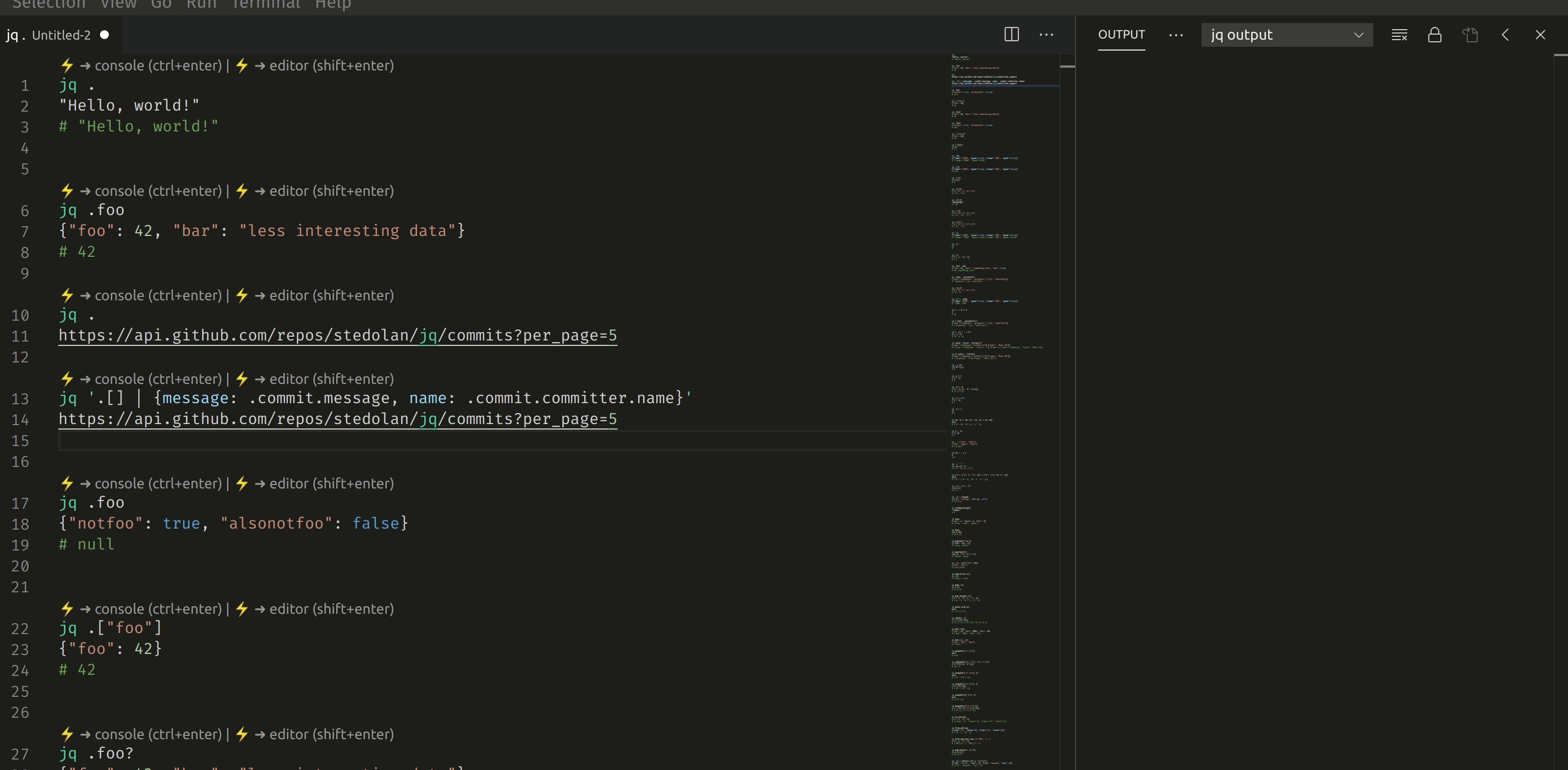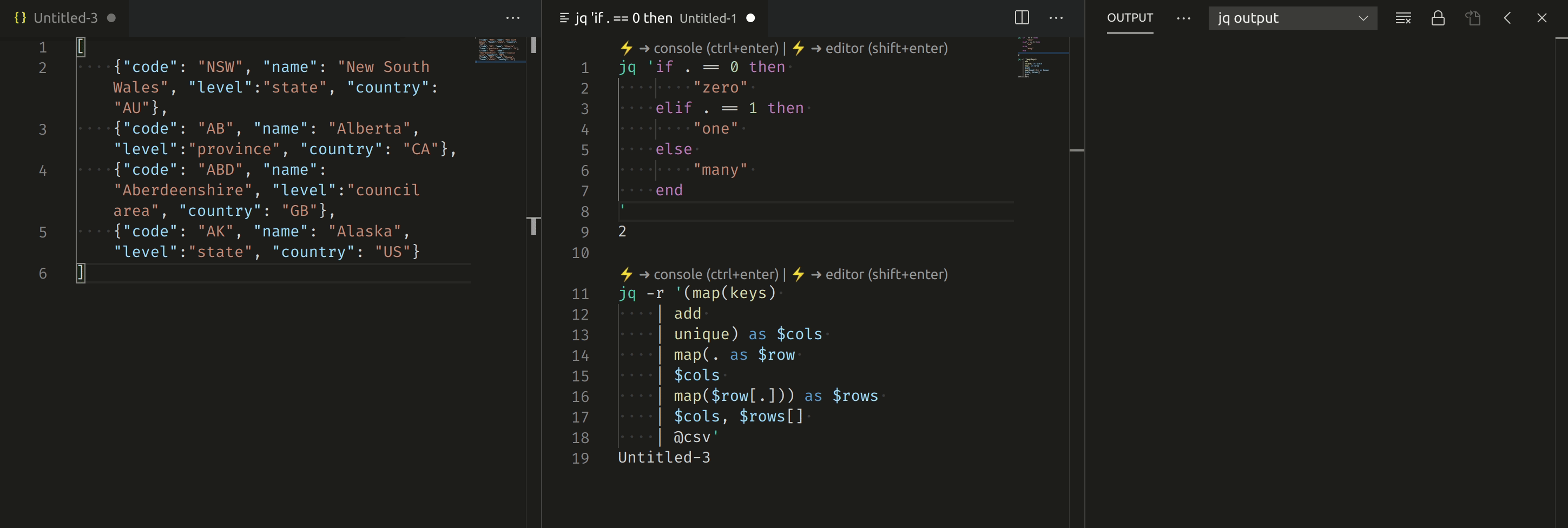VSCode jq playground
Create a notebook with power of jq filters and the power of jq playground extension
Demo
JQ Manual examples

Usage example
Create playground from filter

Filter json on the fly



Autocomplete with inline documentation

Main Features
- Create notebook with multiple executable jq filters in one file
- Support different data inputs:
- json text
- string
- url
- file
- workspace buffer and file
- command line (limited)
- Support input variable
- Redirect output
- Command lines as input with variables support
- Highlighting code
- Autocomplete with documentation and examples
- Open command filter result in output console or in new buffer
- Open examples from jq manual and run it (ctrl+shift+p → jq playground: Examples)
- Support hotkeys
- ctrl+enter → to output
- shift+enter → to editor
Usage
Open new file and change 'Language Mode' to jqpg (JQ PlayGround) or
use a file with .jqpg extension.
Start write jq filters
jq [options] <jq filter>
[ JSON_TEXT | STRINGS | URL | FILE | COMMAND_LINE ]Open official jq examples in jq playground
Command Palette... (ctrl + shift + p): jq playground: ExamplesJSON_TEXT
# Example 1
jq '.foo'
{"foo": 42, "bar": "less interesting data"}
# Example 2
jq '.foo'
{
"foo": 42,
"bar": "less interesting data"
}STRINGS
# Example 1: raw input string
jq -R 'split(" ")'
non arcu risus quis varius quam quisque id diam vel
# Example 2
jq .[5:10]
"less interesting data"URL
# Example 1
jq '.[0] | {message: .commit.message, name: .commit.committer.name}'
https://api.github.com/repos/stedolan/jq/commits?per_page=5FILE
# Example 1: relative pahts
jq '.foo,.bar'
../files/example.json
# Example 2: absolute pahts
jq '.foo,.bar'
/home/dev/files/example.json
# Example 3: buffer file
jq '.'
Untitled-1
# Example 4: workspace file
jq '.'
opened-workspace-file-with-data.json
# Example 5 (Multifile)
jq '{
(input_filename|rtrimstr(".json")) :
.scripts | keys | map(select(. | contains("test"))) }'
/home/dev/client/package.json /home/dev/server/package.jsonCOMMAND_LINE
# Example 1
jq '.token'
$ curl -X GET "http://httpbin.org/bearer" -H "accept: application/json" -H "Authorization: Bearer 1234"
# Example 2
jq -R -s 'split("\n") | .[] | { file: ., lenght: . | length}'
$ ls /etc/COMMAND_LINE (with variables)
TOKEN = 1234
ENDPOINT = bearer
# Example 1
jq '.token'
$ curl -X GET "http://httpbin.org/$ENDPOINT" -H "accept: application/json" -H "Authorization: Bearer $TOKEN"
# Example 2
jq -R -s 'split("\n") | .[] | { file: ., lenght: . | length}'
$ ls $HOMEMultiline jq filter
# Example 1
jq -r '(map(keys)
| add
| unique) as $cols
| map(. as $row
| $cols
| map($row[.])) as $rows
| $cols, $rows[]
| @csv'
[
{"code": "NSW", "name": "New South Wales", "level":"state", "country": "AU"},
{"code": "AB", "name": "Alberta", "level":"province", "country": "CA"},
{"code": "ABD", "name": "Aberdeenshire", "level":"council area", "country": "GB"},
{"code": "AK", "name": "Alaska", "level":"state", "country": "US"}
]
# Exampmle 2
jq 'if . == 0 then
"zero"
elif . == 1 then
"one"
else
"many"
end
'
2Support jq command line options
# Example 1
jq --slurp '. + [5] + [6]'
[
1,
2,
3
]
# Example 2
jq --arg var val '.value = $var'
{}
# Example 3
jq --raw-input --slurp 'split("\\n")'
foo\nbar\nbaz
# Example 4
jq -r '(map(keys) | add | unique) as $cols | map(. as $row | $cols | map($row[.])) as $rows | $cols, $rows[] | @csv'
[
{"code": "NSW", "name": "New South Wales", "level":"state", "country": "AU"},
{"code": "AB", "name": "Alberta", "level":"province", "country": "CA"},
{"code": "ABD", "name": "Aberdeenshire", "level":"council area", "country": "GB"},
{"code": "AK", "name": "Alaska", "level":"state", "country": "US"}
]
# Example 5
jq --raw-output '"\(.one)\t\(.two)"'
{"one":1,"two":"x"}Use workspace file as command input or/and query filter
# Opened workspace file as filter
jq opened-workspace-file-filter.jq
[1, 2, 3, 4, 5]
# Opened workspace file as filter and query input
jq opened-workspace-file-filter.jq
opened-workspace-file-with-data.jsonRedirect output's filter
jq '[.[].url]'
> tmp.json
$ curl 'https://api.github.com/repos/stedolan/jq/commits?per_page=5'Available commands
http|curl|wget|cat|echo|ls|dir|grep|tail|head|find
Input Variable
{
// See https://go.microsoft.com/fwlink/?LinkId=733558
// for the documentation about the tasks.json format
"version": "2.0.0",
"tasks": [
{
"label": "jq test",
"type": "shell",
"command": "curl",
"args": ["-v", "${input:urls}\\¶m=${input:param}"],
"problemMatcher": []
}
],
"inputs": [
{
"id": "urls",
"type": "command",
"command": "extension.executeJqInputCommand",
"args": {
"filter": ".[3]",
"input": "/home/david/dev/tmp/jqpg-examples/tmp.json"
}
},
{
"id": "param",
"type": "command",
"command": "extension.executeJqInputCommand",
"args": {
"filter": ".[2]",
"input": "[10, 50, 100]",
"jsonInput": true
}
}
]
}Open online manual
ctrl+shift+p → > Manual
Open online Tutoral
ctrl+shift+p → > Tutorial
Contributors
Thanks for cwd module patching 💻 Joseph Andersen
Thanks for updating deps and binary 💻 Yoz Grahame
Thanks for input variable 💻 Jeff Mercado
Thanks for input variable 💻 Leonel Galán
Thanks
I be inspired by vscode-jq

